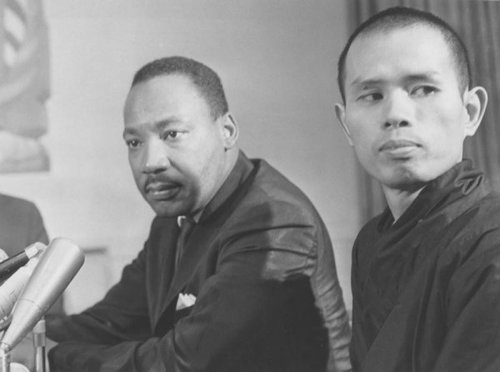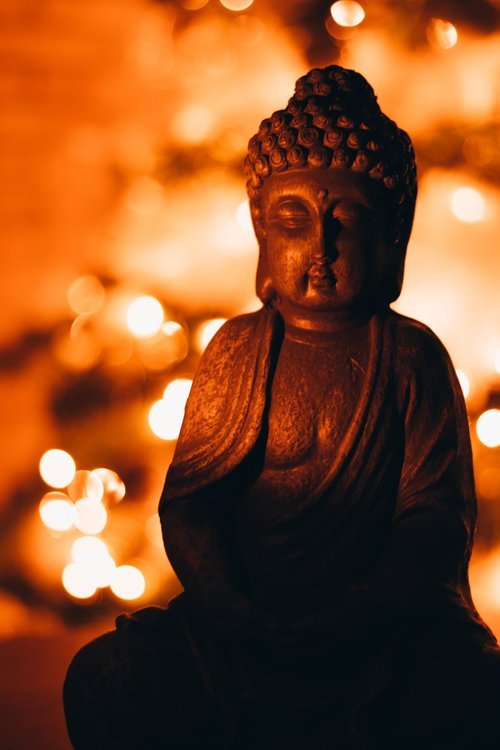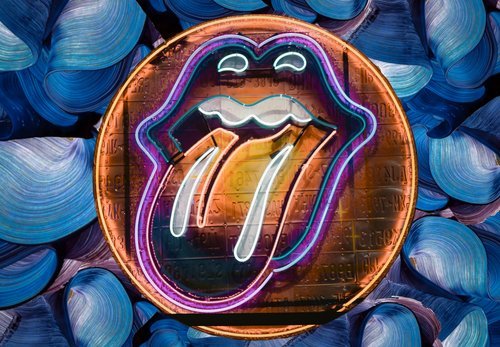
Happiness Series (Part 2): An Alternative to Happy
I believe Buddhism helps me pursue a psychologically rich life. Listening to the Dharma and practicing with a sangha are ways to let the fresh air into our personal garbage cans. But it is not a one-and-done situation. It is an ongoing, life-long commitment for those seeking a meaningful and psychologically rich life.

Two Simple Words
When asked to chair the Eitaikyo Service at Vista Buddhist Temple earlier this year, I had mixed feelings. It would be wonderful to see temple friends in person again. But my other reaction was one of trepidation. I thought, “OH MY GOD, will I be able to fit into my pants?”

A Timeless and Timely New Year’s Wish
I think I’m pretty good at not getting fixated on the negative things that happen, and I’m working on not getting too stressed about something in the future that I have no control over. I will do my best to focus on my life today with acceptance and gratitude. There are many things to be grateful for in a life that provides both sad and happy times.

Happiness Series (Part 1): Forgetting the Self
The things we typically seek for happiness—a new car, big tax refund, losing 10 lbs, or maybe a vacation—can be great but are superficial and fleeting. Or perhaps even motivated by envy—the grass is always greener on the other side. We’re always searching for our next “fix.” How do we sustain happiness in an impermanent world?

Return to the Breath – Remembering Thich Nhat Hanh
On January 22, 2022, the world mourned the passing of Thich Nhat Hanh at his home temple in Vietnam at the age of 95. Known affectionately as "Thay" (pronounced “Tay”) by his followers, he is undoubtedly one of the most well-known Buddhists of the modern era, and his impact in bringing Buddhism to the world was profound. He was a pivotal teacher for me on my Buddhist path, and his passing is deeply felt.

Buddhist Modernism – What is That?
The popular image in the West of Buddhism is of a religion or philosophy of life that emphasizes meditation, relaxation, exploration of the mind and compassion. According to this image, there are no strict rules, it is undogmatic, non-ritualistic, and just encourages creativity and freedom of thoughts which may seem compatible with a modern scientific world view. It is getting more towards spirituality rather than a religion.

How to Practice at Home
Once you have created your home altar you will learn how to use it as a practice space. Instruction and a demonstration on how to properly do an incense offering (oshoko) will be given. Rev. Crane will also lead you through the protocol for conducting either a meditation or chanting session, and how to interpret notations in chanting books for using the bell and modulating tempo. Of course, one can practice in whatever manner they wish in their home, but it is instructive to learn the traditional protocols and choose whether to use them or not.

New Year’s Resolutions And Buddhism
Throughout the history of Buddhism, vows have always been a promise and commitment to the ideas of the Buddha. Some of these vows are followed only by monastics in the form of the Vinaya which governs their temple life. Other vows are adhered to by lay followers in the form of the five precepts that guide ethical behavior. Buddhists can even use vows to benefit all living beings.

Blog Nog - A Buddhist Christmas
Despite the rampant commercialization of the Christmas holiday, there is nonetheless a special feeling we get at this time of year where a spirit of giving and good cheer pervades the air. Something about the end of the year brings nostalgia and a mindset of reflection to look back over the past year. This is a time to think about all the ways we have been supported and helped, human and otherwise.

You Can’t Always Get What You Want
From Siddhartha to the Rolling Stones, there's an important truth in the world: You can't always get what you want, but if you try sometimes, well, you just might find you get what you need."

Thanksgiving Gratitude
Greed, anger and ignorance leads to our suffering: Greed + Anger + Ignorance = Suffering. There are two approaches when dealing with these feelings. The first approach is to remove the negatives from your life. The second approach is to add something positive to your life. For example, if you have an infection, you can either remove the infected area or you can take antibiotics. We call this the antidote approach.
